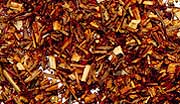| Home A B C D E F G H I J K L M N O P Q R S T U V W X Y Z |
|
Home |
Rooibos; Just the Facts
Rooibos (pronounced “Roy-boss”), botanical name Aspalathus linearis, is clearly gaining popularity in the US due in part to all the hype surrounding the South African herb. I personally get many questions about Rooibos and the various properties and benefits it delivers. Like everyone else I can get drawn up in the “hype” so I decided to do an in-depth look at exactly what we do and do not know about Rooibos and here is what I found. History and Trends * Rooibos has a 300-year history with the first botanical reference recorded in 1772. * It is indigenous to only the southwest coast of Africa in the Cedarburg Mountain region of the Western Cape. * Unlike other herbs Rooibos is available in non-oxidized and oxidized forms (think green tea, non-oxidized vs. black tea, oxidized). * The most commonly consumed type of Rooibos is the dark or oxidized version. * Rooibos is naturally free of caffeine and makes a terrific beverage for anyone avoiding caffeine late in the day or altogether. * Rooibos is delicious hot or cold, is very refreshing and never bitter. * It’s a great addition to recipes or substitute for water and sometimes milk in recipes. * Having shown promise in alleviating the symptoms of psoriases and aiding in the treatment of acne and aging when used topically, I predict that Rooibos will be the next big thing in beauty products. * Rooibos contains natural sweeteners and is calorie free. Dispelling the Myths * Rooibos does not have 50 times the antioxidant benefit of green tea; it does not even have as much. * Rooibos does not contain any vitamin C. * Rooibos does not aid weight loss. Antioxidants fight off free radicals which damage the DNA in our cells making us more prone to diseases like cancer, cardiovascular disease and stroke, to name a few. Antioxidants have the ability to bind these free radicals before they can do damage, making them an important element to good health. Rooibos is a great source of powerful and plentiful antioxidant benefit. Health Facts * Rooibos is all-natural and contains no additives, preservatives or colorants. * Rooibos is naturally free of caffeine, (not decaffeinated; the plant contains no caffeine). * The soothing effect that Rooibos seems to have on the central nervous system may make it an effective sleep aid. * While Rooibos is high in antioxidants, it is not as high as green and black teas. * The antioxidants in Rooibos are also different from those found in green and black teas. * Additionally Rooibos is high in polyphenol content, another type of antioxidant. * Rooibos has its own properties; one is a specific flavonoid that is found only in Rooibos called aspalathin. * Of the 10 identified flavonoid antioxidants in Rooibos, aspalathin is one of three that are found in the greatest quantities. * Green Rooibos or the non-oxidized version has more antioxidant benefit than the more popular oxidized version. * Rooibos contains other nutrients. * Rooibos has been successfully used to treat the symptoms of colic in infants. * Rooibos can relieve stomach and digestive disorders such as nausea, vomiting, heartburn, cramps and constipation in adults. So what is the bottom line? If you like Rooibos, drink it. It tastes great, is inexpensive, has no caffeine or calories and is certainly beneficial to your health. If you are adventurous, experiment using Rooibos in your favorite recipe or as a skin tonic. About The Author |
|
|
|
|
|
Glossary References Links Contact
|